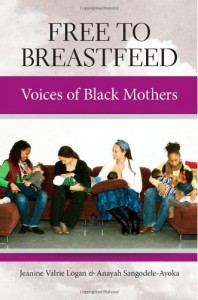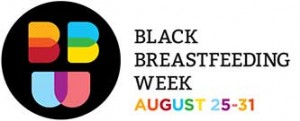Top Five Reasons Why We Need A Black Breastfeeding Week
Editor’s Note: While World Breastfeeding Week is celebrated August 1-7, and the US National Breastfeeding Month lasts for the entire month of August, Black Breastfeeding Week, begun in 2012, is celebrated August 25-31. Find out below why it is important to recognize the shocking racial disparities in infant death and “first food deserts” for breastfeeding support culturally unique to the African-American community. Scroll to the end to see this year’s African-American Breastfeeding Project mini-documentary, released this week.
Top Five Reasons We Need A Black Breastfeeding Week
It is not a secret that for over 40 years there has been a gaping racial disparity in breastfeeding rates. The most recent CDC data show that 75% of white women have ever breastfed versus 58.9% of black women. The fact that racial disparity in initiation and even bigger one for duration has lingered for so long is reason enough to take 7 days to focus on the issue, but for those who may be confused by their view from suburbia, blinded by their white privilege or otherwise need more convincing, I’ve put together (Letterman style) the Top 5 Reasons Why We Need a Black Breastfeeding Week.

5. Black babies are dying at twice the rate (in some place, nearly triple) the rate of white babies. This is a fact. The high infant mortality rate among black infants is mostly to their being disproportionately born too small, too sick or too soon. These babies need the immunities and nutritional benefit of breast milk the most. According to the CDC, increased breastfeeding among black women could decrease infant mortality rates by as much as 50%. So when I say breastfeeding is a life or death matter, this is what I mean. And it is not up for debate or commenting. This is the only reason I have ever needed to do this work, but I will continue with the list anyway.
4. When you look at all the health conditions that breast milk—as the most complete “first food,” has been proven to reduce the risks of—African American children have them the most. From upper respiratory infections and Type II diabetes to asthma, Sudden Infant Death Syndrome and childhood obesity—these issues are rampant in our communities. And breast milk is the best preventative medicine nature provides. This is a public health issue in our community not a lifestyle choice. FYI, Black women don’t always have those.
3. Not only are there blatant racial disparities in breastfeeding rates, there is a blatant disparity in breastfeeding leadership as well. It is not debatable that breastfeeding advocacy is white female-led. This is a problem. For one, it unfortunately perpetuates the common misconception that black women don’t breastfeed. It also means that many of the lactation professionals, though well-intentioned, are not culturally competent, sensitive or relevant enough to properly deal with African American moms. This is a week to discuss the lack of diversity among lactation consultants and to change our narrative. A time to highlight, celebrate and showcase the breastfeeding champions in our community who are often invisible. And to make sure that breastfeeding leadership also reflects the same parity we seek among women who breastfeed.
2. While many of the “booby traps” to breastfeeding are universal, Black women also have unique cultural barriers and a complex history connected to breastfeeding. From our role as wet nurses in slavery being forced to breastfeed and nurture our slave owners children often to the detriment of our children, to the lack of mainstream role models and multi-generational support , to our own stereotyping within our community—we have a different dialogue around breastfeeding and it needs special attention.
1. Many African American communities are “first food deserts”—it’s a term I coined to describe the desert like conditions in many urban areas I visited where women cannot access support for the best first food-breast milk. It is not fair to ask women, any woman, to breastfeed when she lives in a community that is devoid of support. It is a set up for failure. Please watch this video and educate yourself on the conditions in many vulnerable communities about what you can do (beyond leaving comments on blogs) to help transform these areas from “first food deserts” into First Food Friendly neighborhoods.
And the bonus #1 reason why we need a Black Breastfeeding Week is: Because. We. Said. So. We, the people who are from and of the black community. Those of us who are respected for leading the charge in increasing breastfeeding rates among black women. Those of us who are on the ground, doing the work and working for change. Those of us who have faced the cultural struggles while breastfeeding our own children and want something better for future mothers and babies. I’m confident that the majority of people who are complaining about Black Breastfeeding Week haven’t seen what I’ve seen. They haven’t driven some 30 miles outside Birmingham, AL just to find a breastfeeding support group–or other urban areas where La Leche League doesn’t exist. They haven’t held a premature baby who desperately needs breast milk but keeps spitting up formula. They haven’t stood on street corners and in front of WIC offices surveying new mothers and fathers, who said that their doctors never even gave them information about breastfeeding. They have likely never stepped into a black community or a black home or a black church to understand the lack of resources available or the negative sentiment and myths that linger about breastfeeding. So until you have walked where I have walked, seen what I have seen and stood where I have stood, please do not have the audacity to tell me and my community what we do and do not need.
Yes, we are all in this together. But some of us need more attention to get us there.
In motherhood,
Kimberly Seals Allers
Originally posted in Mochal Manual.
Is Your Community “First Food Friendly”?
All across America, in far too many communities, women leave their local hospital after giving birth only to enter a community that is a virtual desert of breastfeeding support. Limited access to lactation rooms in public places. Inaccessible breastfeeding support groups. And minimal social acceptance, to name a few barriers. Mothers in these areas struggle–even when determined–to give their babies the best first food possible. As a result their breastfeeding experience is compromised or cut short. Many of these same communities suffer from high infant mortality rates, poor infant health and high levels of childhood obesity–critical health risks proven to be reduced by breastfeeding. We can do better! Join the movement to ensure that all communities are First Food Friendly–a place where all mothers and babies thrive! Learn what you can do to change desert-like communities across the country into flourishing, First Food Friendly environments.
Our groundbreaking pilot project in New Orleans, LA, Jackson, MS, and Birmingham, AL found key characteristics for what a community needs to look like to better support any mother that chooses to breastfeed. We can transform the landscape for healthier babies one community at a time. Join the movement now!
– See more at: http://befirstfoodfriendly.org
The African American Breastfeeding Project
In honor of Black Breastfeeding Week (Aug 25-31) The African American Breastfeeding Project is releasing a mini doc featuring clips from black breastfeeding mothers and educators about the unique experiences of black women and breastfeeding. Follow Black Breastfeeding Week on Facebook.
Uncovering Breastfeeding Misconceptions and Myths
Photo: Shutterstock/Aneeka



Why do you want to separate us? We are women, MOTHERS, who need support from other motgers of all backgrounds.